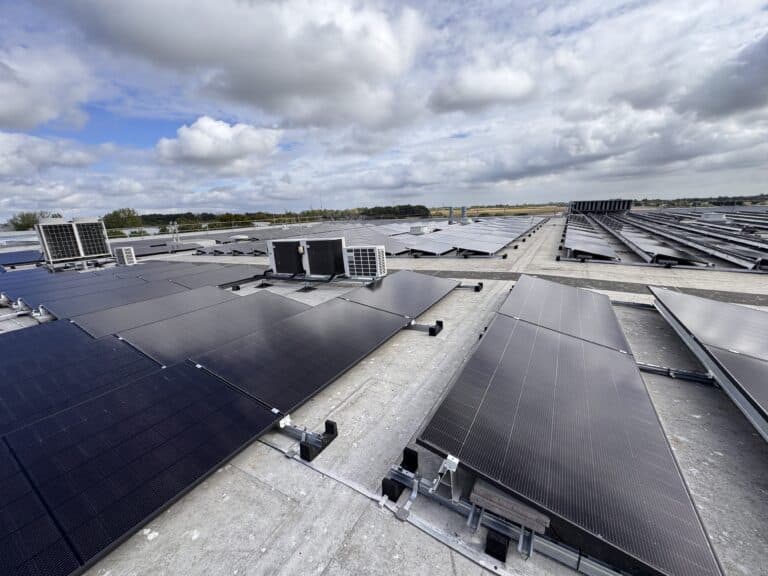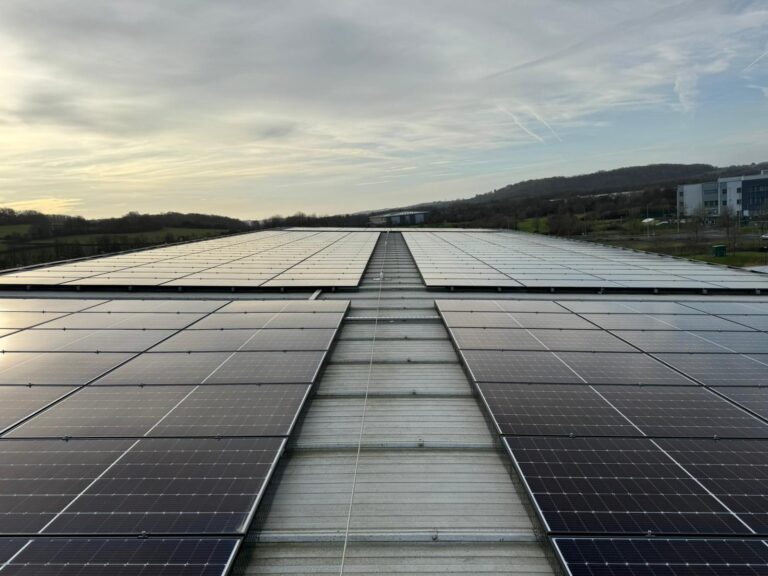Commercial Property Solar Panels: A Smarter Investment for Long-Term Returns
Commercial property solar panels are one of the best ways to improve asset value, cut running costs, and meet today’s sustainability standards. With energy prices still unpredictable and tenants seeking greener buildings, renewable energy is not just a trend; it’s a smart investment that offers clear returns.
By converting unused roof space into a productive, money-making asset, landlords can boost both the financial and environmental performance of their properties. Whether you manage warehouses, retail spaces, or office buildings, the reasons for installing commercial solar panels have never been more compelling.

What Are the Key Benefits for Commercial Landlords
1. Create New Revenue Streams
Solar technology enables landlords to make money from their roof space. With a Power Purchase Agreement (PPA), you can install a system and sell the generated electricity directly to tenants at a lower rate. This benefits everyone; you receive a steady, long-term income while tenants save on their energy bills and get access to renewable electricity. For larger portfolios, this can be a significant and growing source of extra revenue, especially as the demand for electricity keeps increasing.
2. Increase Property Value and Marketability
Properties that use renewable technologies have a competitive advantage. Buildings equipped with commercial solar panels are more appealing to tenants who want energy-efficient spaces or are working to reach their own ESG (Environmental, Social, and Governance) goals. Research shows that green-certified buildings achieve higher rental yields and quicker occupancy rates. For commercial landlords, this means better tenant retention, increased capital value, and greater long-term profitability.
3. Improve Energy Performance and Ratings
The UK’s tightening regulations on energy performance put pressure on landlords to improve their Energy Performance Certificate (EPC) ratings. Installing solar panels for commercial premises is a direct and effective way to meet these requirements and avoid potential restrictions on leasing below-standard buildings. A good solar system raises EPC scores, helping landlords meet Minimum Energy Efficiency Standards (MEES). It also shows their commitment to environmental responsibility to investors, regulators, and tenants.
4. Reduce Operational Costs
Landlords can use solar power to provide electricity for shared areas, parking lots, elevators, and lighting. This reduces operating costs. They can pass these savings on to tenants as part of the service charge or reinvest them back into the property.
5. Future-Proof Assets
Installing solar is also a smart way to protect against future changes in energy market prices. As grid electricity costs keep changing, producing your own power on-site provides more stability and control over your long-term energy expenses. It also prepares your assets for upcoming rules on sustainability and reducing carbon emissions.
Financing Options for Commercial Property Solar Panels
Many landlords are often surprised by how flexible and accessible commercial solar financing has become. Whether you want to invest money upfront or look into zero-cost installation options, there’s a way to fit every business model.
Self-Financing (CapEx)
For landlords with available capital, buying the solar PV system outright gives the best returns over time. You own the equipment from the start, directly benefit from all the energy savings, and experience the shortest payback period.
Asset Finance
This finance option allows landlords to buy solar equipment with a loan meant for physical assets. Repayments can often be balanced by immediate energy savings. Asset finance may also offer tax benefits under UK corporate finance rules.
Power Purchase Agreement (PPA)
A PPA lets you install solar panels without any upfront cost. A third-party developer pays for, sets up, and maintains the system. You only need to provide the roof space and buy the electricity it generates at a lower rate. This setup gives you immediate benefits without tapping into your capital reserves.
Government Grants and Tax Benefits
While solar panel grants for landlords are less direct now than in previous years, there are still financial benefits to consider. Depending on your property's location, size, and industry type, you may find local or regional energy programs available.
Additionally, tax allowances like the Annual Investment Allowance (AIA) let landlords deduct the entire cost of qualifying solar equipment from taxable profits. This can improve the overall return on investment for the project.

Landlord-Tenant Legal and Practical Considerations
Installing solar panels on commercial property requires careful coordination between the landlord and tenant to ensure a smooth and compliant rollout.
Lease Agreements
Existing leases may need updating to cover solar installations. This could involve specifying access rights for installation and maintenance, defining who pays what, and clarifying how generated electricity is shared.
Licence to Alter
If a tenant funds or installs a system, a Licence to Alter will formalise consent. It will define the conditions for installation and the obligations for removal at the end of the lease.
Ownership and Liability
Clear terms must outline who owns the panels and who is responsible for maintenance, insurance, and liability in case of damage or system failure.
Billing Structure
If landlords sell energy to tenants, a PPA can define pricing, terms, and consumption rights. For properties with multiple tenants, sub-metering ensures accurate billing for each occupant's usage.
Maintenance Obligations
While managing and maintaining solar projects typically requires minimal effort, landlords should clarify whether costs for inspection, cleaning, or inverter servicing can be covered by the service charge or if they remain as landlord expenses.
Insurance and Risk Management
Landlords should ensure their property insurance covers the solar installation, including risks like roof access or potential leaks. Clear agreements with tenants on insurance responsibilities help prevent disputes and protect all parties.
The Commercial Property Solar Installation Process
1. Feasibility Study
A professional solar installer will conduct a complete site assessment. They will review the roof structure, energy needs, and sunlight exposure to recommend the best system design and size.
2. Permissions and Consents
The installer will take care of all planning permissions and communicate with the Distribution Network Operator (DNO) to get grid connection approval. Most rooftop commercial solar projects are classified as permitted development, which simplifies the process.
3. Financing
After confirming the system size and structure, the financing arrangements will be finalised. This can occur through direct purchase, asset finance, or a third-party PPA model.
4. Installation
Experienced MCS-accredited installers will carry out the installation with minimal impact on building operations. This process is usually quick, efficient, and non-invasive, often finished within a few weeks.
5. Monitoring and Maintenance
Modern commercial solar systems come with monitoring platforms that provide real-time performance data. Many installers also offer long-term service contracts for inspections, cleaning, and performance improvement.
6. Performance Review and ROI Tracking
After the system is live, a performance review checks energy generation, cost savings, and overall efficiency. Landlords can evaluate ROI, share benefits with tenants, and think about future upgrades such as battery storage or system expansion. Regular reviews keep everyone accountable and show the long-term financial and environmental value of the investment.
For landlords, this phase is a great time to evaluate return on investment (ROI), share benefits with tenants, and explore future improvements like battery storage integration or system expansion. Regular performance reviews keep everyone accountable and show measurable environmental progress, highlighting the long-term financial and sustainability value of the investment.
A Forward-Thinking Move for UK Commercial Landlords
As the UK speeds up its move to net-zero, commercial property landlords can take the lead. Solar energy offers a real chance to boost returns, improve property portfolios, and meet the rising demand for sustainable commercial spaces.
With options like commercial solar financing, grants for landlords, and new solar project management techniques, the route to renewable energy is clearer than ever.
For landlords wanting to stay competitive, follow the rules, and prepare for the future, solar is not just an upgrade. It is a long-term investment in both profit and the planet.
Get in touch today to discuss how solar can transform your commercial property portfolio into a profitable, sustainable asset for the future.
